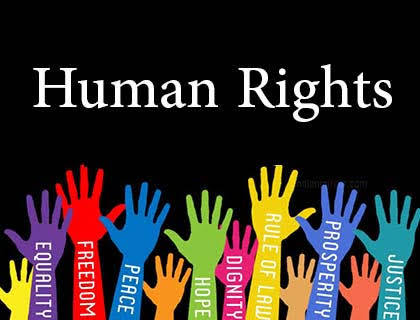Human rights
.jpg)
Preamble
Whereas recognition of the inherent dignity and of the equal and inalienable rights of all members of the human family is the foundation of freedom, justice and peace in the world,
Whereas disregard and contempt for human rights have resulted in barbarous acts which have outraged the conscience of mankind, and the advent of a world in which human beings shall enjoy freedom of speech and belief and freedom from fear and want has been proclaimed as the highest aspiration of the common people,
Whereas it is essential, if man is not to be compelled to have recourse, as a last resort, to rebellion against tyranny and oppression, that human rights should be protected by the rule of law,
Whereas it is essential to promote the development of friendly relations between nations,
Whereas the peoples of the United Nations have in the Charter reaffirmed their faith in fundamental human rights, in the dignity and worth of the human person and in the equal rights of men and women and have determined to promote social progress and better standards of life in larger freedom,
Whereas Member States have pledged themselves to achieve, in co-operation with the United Nations, the promotion of universal respect for and observance of human rights and fundamental freedoms,
Whereas a common understanding of these rights and freedoms is of the greatest importance for the full realization of this pledge,
Now, Therefore THE GENERAL ASSEMBLY proclaims THIS UNIVERSAL DECLARATION OF HUMAN RIGHTS as a common standard of achievement for all peoples and all nations, to the end that every individual and every organ of society, keeping this Declaration constantly in mind, shall strive by teaching and education to promote respect for these rights and freedoms and by progressive measures, national and international, to secure their universal and effective recognition and observance, both among the peoples of Member States themselves and among the peoples of territories under their jurisdiction.
What are human rights?
Human rights are rights inherent to all human beings, whatever our nationality, place of residence, sex, national or ethnic origin, colour, religion, language, or any other status. We are all equally entitled to our human rights without discrimination. These rights are all interrelated, interdependent and indivisible.
Universal human rights are often expressed and guaranteed by law, in the forms of treaties, customary international law , general principles and other sources of international law. International human rights law lays down obligations of Governments to act in certain ways or to refrain from certain acts, in order to promote and protect human rights and fundamental freedoms of individuals or groups.
Where do human rights come from?
The idea that human beings should have a set of basic rights and freedoms has deep roots in Britain. Landmark developments in Britain include the Magna Carta of 1215, the Habeas Corpus Act of 1679 and the Bill of Rights of 1689. See the British Library's website for more information on these and other icons of liberty and progress.
The atrocities of the Second World War made the protection of human rights an international priority. The formation of the United Nations paved the way for more than 50 Member States to contribute to the final draft of the Universal Declaration of Human Rights, adopted in 1948. This was the first attempt to set out at a global level the fundamental rights and freedoms shared by all human beings.
The Universal Declaration of Human Rights is brought to life in this four-minute video, 'Everybody - we are all born free', produced by Amnesty.
The Declaration formed the basis for the European Convention on Human Rights, adopted in 1950. British lawyers played a key role in drafting the Convention, with Winston Churchill also heavily involved. It protects the human rights of people in countries that belong to the Council of Europe, including the UK.
The Human Rights Act 1998 made these rights part of our domestic law. The Act means that courts in the United Kingdom can hear human rights cases. Before it was passed, people had to take their complaints to the European Court of Human Rights in Strasbourg, France.
Nice post.
Congratulations @lakahayverma! You have received a personal award!
Click on the badge to view your Board of Honor.
Do not miss the last post from @steemitboard:
Congratulations @lakahayverma! You received a personal award!
You can view your badges on your Steem Board and compare to others on the Steem Ranking
Do not miss the last post from @steemitboard:
Vote for @Steemitboard as a witness to get one more award and increased upvotes!